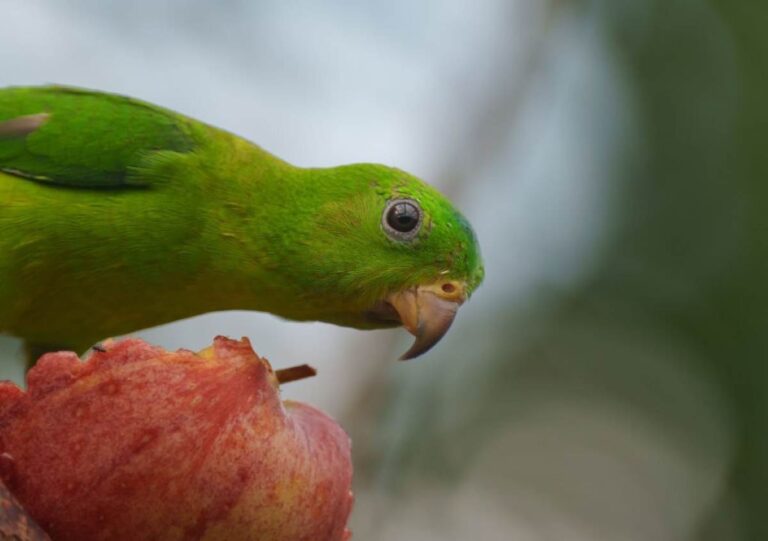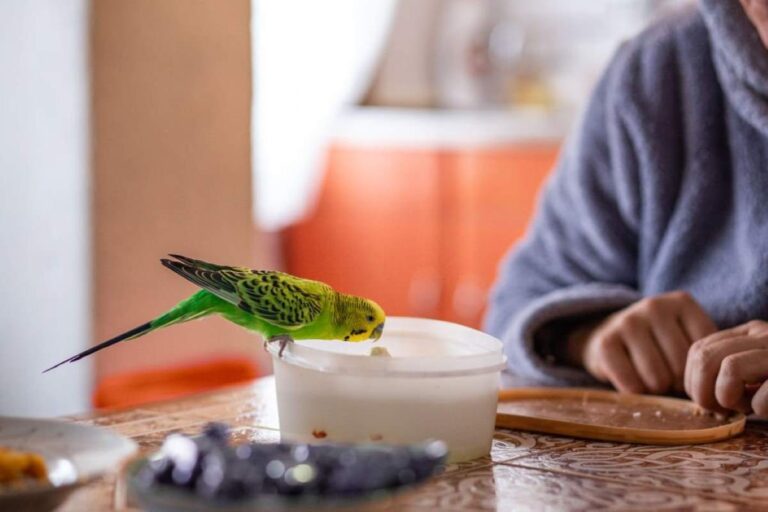Do Birds Eat Ants?
Many bird species, such as woodpeckers, starlings, and sparrows, indeed include ants in their diet. These insects serve as a nutritious food source, providing essential proteins and fats. However, it’s important to note that not all bird species consume ants, and the extent of consumption varies based on species, habitat, and availability of ants.

Ever find yourself gazing at a flock of birds and wondering about the mysteries of their diets? Specifically, have you ever asked yourself, “Do birds eat ants?” We’ve got some surprising answers waiting for you. From the common backyard species you see every day to the exotic ones living in far-off jungles, many birds have an astonishing dietary secret – they feast on ants!
But it doesn’t end there. The relationship between our feathered friends and these tiny crawlers is more intricate and fascinating than you’d ever imagine. We’re going to delve into which birds can’t resist an ant meal, why they do it, and how this ant consumption impacts them. So stick around, as we’re about to embark on an exciting exploration that will make you see birds and ants in a whole new light!
Key Takeaways:
- Numerous bird species, including woodpeckers, starlings, and sparrows, consume ants as part of their diet.
- Ants are a significant source of nutrition for these birds, offering essential proteins and fats.
- Ant consumption varies among bird species and depends on factors such as habitat and the availability of ants.
- Some bird species, like the Northern Flicker and the Pileated Woodpecker, can consume thousands of ants in a single day.
- Birds employ specialized hunting techniques to safely and efficiently consume ants, avoiding potential defenses like stings, bites, and formic acid.
- Ants also play a role in a unique bird behavior known as “anting,” where birds rub ants on their feathers, possibly for preening or as an insect repellent.
- While ants provide many benefits to birds, their consumption also carries potential risks, such as toxicity from certain ant species.
- Changes in ant populations due to environmental factors can affect bird diets, underscoring the intricate relationship between these two creatures.
Can Birds Eat Ants?
One intriguing question that often comes up in discussions about bird diets is, “Do birds eat ants?” The short answer is yes, many bird species do indeed eat ants. Ants serve as a significant food source for a variety of bird species around the world, supplying them with necessary nutrients.
Birds’ diets are highly varied and depend largely on their species, habitat, and the time of year. Despite the generalization that birds feed primarily on seeds, berries, and nectar, many species also rely on insects, including ants, for a significant portion of their nutrition.
Ants are abundant and can be found in nearly every corner of the world, making them a readily accessible food source for birds. Moreover, ants can provide protein, fat, and other nutrients that may not be as readily available from plant sources. Consuming ants allows birds to diversify their diet, which is essential for their overall health and well-being.
However, it’s worth noting that not all bird species eat ants. Those that do have often developed specialized hunting techniques and behaviors to safely and efficiently consume these often pugnacious insects.
Some species of ants have defensive mechanisms, such as stinging or biting, and others produce formic acid, which can be irritating or harmful to potential predators. However, the birds that prey on ants have developed ways to handle these defenses.
For instance, some birds will only consume specific parts of the ant, avoiding the segment where the formic acid is produced. Others have been observed dropping ants onto the ground or rubbing them against a surface to remove the acid before eating.
In essence, ants form an important part of the diet for many birds, offering them a reliable and nutritious food source. But the consumption of ants by birds goes deeper than simply serving as a food source. The relationship between ants and birds is complex and involves unique behaviors and adaptations that extend beyond diet alone.
Which Birds Eat Ants?
It’s fascinating to note that not all bird species indulge in ants. However, several species are known to specifically seek out ants as part of their regular diet. This section will be divided into two main subsections: “Ant-Eating Bird Species” and “Uncommon Bird Species That Eat Ants“.
Ant-Eating Bird Species
Among the most well-known ant-eating birds are woodpeckers and starlings.
Woodpeckers have a specialized tongue and beak that allows them to excavate wood and earth to reach ant colonies. Species such as the Northern Flicker and the Pileated Woodpecker in North America are particularly fond of ants and can consume thousands in a single day.
Starlings, on the other hand, use their sharp, pointed beaks to probe the ground for insects, including ants. Their keen sense of hearing allows them to detect the movements of ants and other insects beneath the surface.
Other common ant-eating birds include sparrows, wrens, and robins. These species commonly forage on the ground and eat a variety of insects, ants included, especially during the breeding season when the demand for protein is high.
Uncommon Bird Species That Eat Ants
There are also less common bird species that include ants in their diet. For instance, the antbirds of Central and South America have a specialized diet almost exclusively composed of ants and termites. Similarly, the Spotted Antbird often follows swarms of army ants to catch any insects trying to escape, consuming the ants themselves if other food sources are scarce.
In conclusion, a wide array of bird species incorporate ants into their diet, each with its unique hunting techniques and dietary preferences. Whether they are common or uncommon species, these birds have shown remarkable adaptability in their quest for these tiny yet nutritious creatures.
Role of Ants in Birds’ Diet
Ants don’t just provide a source of sustenance for birds; their role extends much further. Two key aspects to consider here are the “Nutrition Provided by Ants” and the intriguing “Anting Behavior in Birds“.
Nutrition Provided by Ants
Ants are a rich source of protein, a macronutrient that is essential for birds, especially during their growing stage and breeding season. This is because protein contributes to the development and repair of body tissues, including feathers and muscles. Notably, queen ants and larvae, which contain higher amounts of fat compared to worker ants, are especially nutritious.
Apart from protein, ants also provide a source of fats, another essential macronutrient, particularly for migratory birds that require high-energy food sources to fuel their long flights. Additionally, ants offer small amounts of various micronutrients, including calcium, iron, and zinc, which are necessary for birds’ overall health and well-being.
Anting Behavior in Birds
Beyond nutrition, ants play a fascinating role in a peculiar avian behavior known as “anting.” During anting, birds will typically sit in an ant colony or pick up ants and rub them on their feathers and skin. While the exact reason for this behavior remains a subject of debate among ornithologists, it’s believed that birds might use the formic acid produced by ants as a form of insect repellent or to soothe irritated skin.
Furthermore, some suggest that anting helps in preening, as the formic acid could help break down unwanted oils on feathers, thereby improving their flight efficiency. Remarkably, over 200 bird species, including starlings and crows, have been observed exhibiting this unique behavior.
In essence, ants serve a multifaceted role in the lives of birds. From being a nutritional food source to contributing to the intriguing phenomenon of anting, ants prove to be more than just a dietary component in the bird world.
How Ant Consumption Affects Birds
Ants form an essential part of the diet for many bird species, offering both nutritional value and engaging them in unique behaviors. However, ant consumption can have varying effects on birds, encompassing both positive and potentially negative impacts.
Positive Impacts
The primary benefit of ant consumption for birds is nutritional. As previously noted, ants provide essential nutrients such as proteins and fats, crucial for birds’ growth, repair, and energy needs. By including ants in their diet, birds can maintain a balanced and diversified diet, which is integral for their overall health.
Ants also play a critical role in the fascinating “anting” behavior observed in various bird species. While the reasons behind anting remain speculative, it is thought to help birds with preening, possibly acting as a form of insect repellent, and possibly soothing skin irritations.
Potential Negative Impacts
While ants offer many benefits to birds, there can also be potential drawbacks to their consumption. Some ants possess strong defensive mechanisms, such as stings, bites, or the ability to spray or secrete formic acid. For birds, especially those not adapted to handle these defenses, ant consumption can lead to discomfort or harm.
Certain ant species are known to be toxic when ingested. For instance, fire ants can be especially dangerous, and consuming them can lead to serious health issues in birds.
Furthermore, changes in ant populations due to environmental factors can also indirectly affect birds. Reduced ant availability might compel birds to seek alternative, possibly less nutritious food sources, potentially affecting their health and survival.
In conclusion, while ants form a valuable part of the diet for many bird species, it’s important to acknowledge the potential risks involved. The relationship between ants and birds is intricate, marked by both cooperation and conflict, further highlighting the complexity of nature’s food webs.
Final Thoughts
The surprising truth behind the age-old question, “Do birds eat ants?” The answer is a resounding yes for a diverse array of bird species. From woodpeckers drilling into ant colonies to the lesser-known antbirds capitalizing on fleeing insects during ant swarms, it’s clear that ants are more than just tiny critters – they are a significant part of the avian world.
As we’ve discovered, the role of ants extends beyond nutrition. They are also the stars in the curious phenomenon of anting, which remains a captivating area of study for ornithologists. But as with all things in nature, the ant-bird relationship is a delicate balance of benefits and potential risks.
We hope this journey through the intricate dance between birds and ants has given you a fresh perspective on these fascinating creatures. So, the next time you spot a bird in your backyard, remember, it might just be on the hunt for its next ant feast!
Frequently Asked Questions
1. Do chickens eat ants?
Yes, chickens do eat ants. They are omnivores and will consume a variety of insects, including ants, as part of their diet.
2. Do budgies eat ants?
Budgies typically eat seeds, fruits, and vegetables, but they can consume small insects like ants occasionally.
3. Do ducks eat ants?
Ducks are omnivores and their diet can include insects like ants. However, they prefer aquatic invertebrates, grains, and plant matter.
4. Do chickens eat mosquitoes?
Chickens will eat mosquitoes. Their diet includes various insects, which they actively hunt and peck at throughout the day.
5. Do chickens eat flies?
Yes, chickens do eat flies. As omnivores, they will eat virtually any insect they can catch, including flies.

Martin Cooper
Hello and welcome! I’m an avid bird enthusiast, dedicated to observing, understanding, and documenting our feathery friends. I hope my passion and knowledge inspires your own avian admiration! Join me as we soar into this fascinating world.






